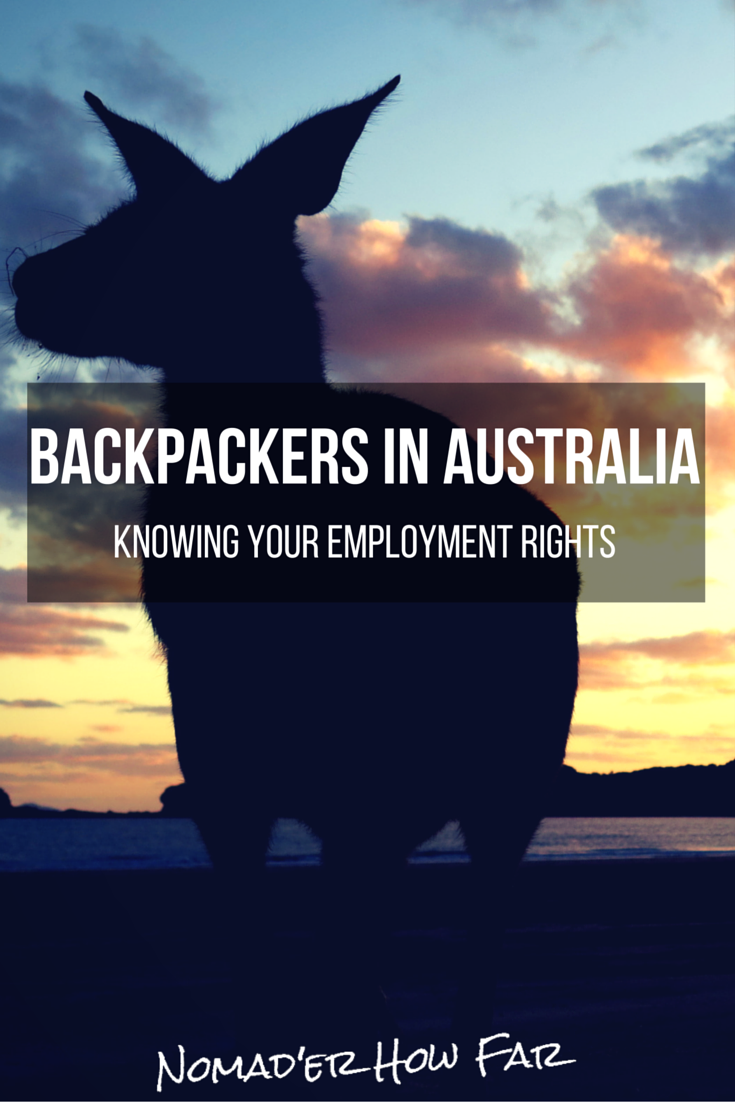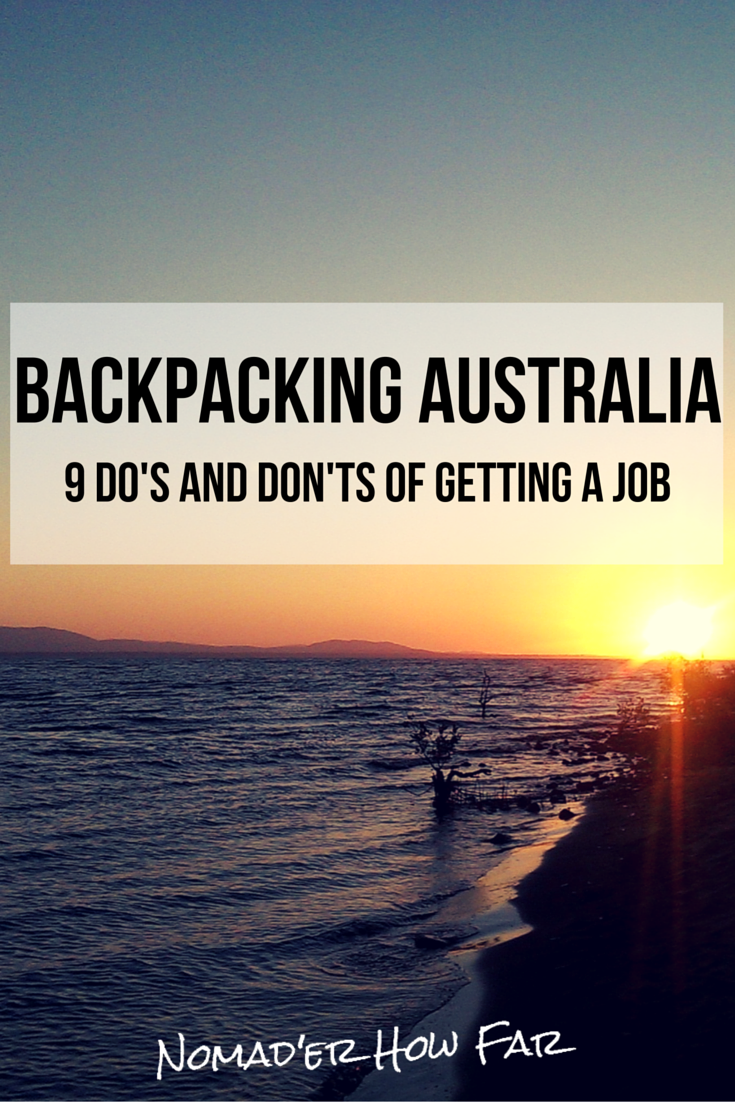
THE BLOG
Essential Information For Backpackers In Australia
I've decided it's time to set the record straight on a few things and answer all those random questions I hear about employment, 2nd year visas and tax.
Essential Information for Backpackers in Australia: Visa's, tax and employment
We've been in Australia for 1.5 years, so of course we are experts now...
Hah! we still have much to see and learn, but moving between hostels and being around fellow travellers, having experienced working holiday life for so long now, we hear many of them asking the same questions repeatedly, and we often have the answers.
I get not everyone does a lot of research prior to coming to Australia, winging it a tad, and many might have been misinformed along the way, so, I've decided it's time to set the record straight on a few things and answer all those random questions I hear about employment, 2nd year visas and tax.
Tax
Working in Australia of course involves paying tax. When arriving in Australia we recommend that apply for your TFN straight away; technically you have 28 days after beginning a job to apply for one, but its much easier to have it already.
Your TFN, a tax file number, is uniquely assigned to your person and you then quote it to employers so that they can correctly file your taxes.
For years now, backpackers have been able to get back the tax they pay on their earnings, seeing that many are only here for a short duration in the scheme of things.
However, you may be aware that the Aussie government is pushing to stop all of us from being able to get back the tax, which we currently pay at a rate of 32.5%.
As a working-holiday-maker, who does nothing but spend in this country (and ironically spend my tax return in the tourism industry) this is a really sucky proposal. Many working holiday makers pass through this country only spending, never utilizing the health-care system etc.
I find it very odd that an affluent country who has whole industries reliant on the money of eager travellers, who want to stick around, work and most importantly, spend, wants to essentially punish those individuals by withholding massive amounts of their hard-earned cash.
But anyway, that's a whole other discussion...
At current there is no legislation drafted (as of August 2016) and so this move may be a while off, or, in the same terrible fashion as last year, when they brought in an end-date to wwoofing for a 2nd year visa with only a week's notice, this change really could come in at any point.
Either way, if you have been in Australia for more than 6-months between July 2015 and July 2016, and spend a fair bit of that time in employment, then you paid tax, which you can get back between between July and October 2016, by submitting a tax return online.
Many companies will offer to do all this for you, minus a $70-100 fee... But I did it the usual way, going it alone for free, and it took 10 minutes. 10 MINUTES.
How To Get Your Tax Back
Go to the website mygov. You may already have a mygov account linked to previous visa applications etc. If not, then create an account.
After creating an account, a page will come up stating 'Linked services'. You want to link up your mygov account to the ATO (the people with all your tax).
This may involve a short phone call to the ATO to confirm your identity, but its a clearly guided process on the website on how to do this.
You are now ready to submit you're return. Locate where it says 'Lodge a return'.
Fill in the fields accordingly. You DO NOT need your payment summaries to do this, as you should be able to locate the key figures of GROSS INCOME and GROSS TAX PAID from your last or latest payslip for each job you've had/are currently doing, up until the July 1st 2016 cut-off point. Your payslip should always display the pay received that date, and the total received in the Year-To-Date plus the tax paid in the YTD. Your payment summary will either be sent to the ATO by your employer, or sent to you, and it will show the same figures. So for example, I was able to use the last payslip from a job I had until January, and then for the job I was doing in June, I just used my last payslip received for work prior to July 1st.
You should receive tax back within 1-2 weeks from lodging the return. Ensure your bank details are correct, or someone else might up with your 000's!
Superannuation
Yes, the government takes some tax (and in the future, would like to keep hold of it) but you also get the added bonus of paying 'Super'.
Your employer should pay a small amount each pay-date (an amount equal to 9.5% of your total salary) into your own super fund. You need to open a super account for them to send it to, almost like enforced but painless saving, and when you leave Australia for good, you can draw the money out.
There are many companies offering super accounts, but we went with First State Super, opening an entirely free account. Your super company will invest your money either along with the market conditions, or you can choose how to invest it. We more or less chose the simplest options when opening the accounts and our money is managed solely by the account provider.
2nd Year Visa
Last year, 1 month into living and working on a farm, the government abruptly announced that wwoofing (unpaid voluntary work where food and accommodation are provided in return for labour) would no longer be accepted regional work eligible for a 2nd year visa.
We launched into a rant about it here on the blog, garnering a lot of social media attention. We also eventually submitted a paper to go to government with the WWOOF Australia guys, to support the case for it to stay as an accepted work type.
Luckily for us, the new rules didn't take effect until after we had finished our farm stint, but unfortunately for others, those big changes, still happened. It's competitive enough for people to find paid farm work and fruit-picking that isn't dehumanizing and tough beyond all reason, so this really has fuelled that fire.
As it stands, from December 1st 2015, applicants had to submit payslips as evidence in the visa application process, so basically, farmers would have to start coughing up money they didn't have, or face losing willing and able workers. Workers on the other hand would then miss out on meeting great farming families who depended upon them to thrive.
Securing Farm work or Fruit-picking
The best way to get your 2nd-year visa work hasn't changed. You still need to be looking, enquiring and researching. From Facebook groups, to specialist farming job websites, through to sites like backpackerjobs, TAW, indeed.com, and good old gumtree, jobs will be listed across these places regularly.
It can never hurt to ask around if you are staying in a hostel in an area where there might be eligible regional work, enquiring with the hostel staff or your fellow travellers who may have already completed their paid farm work.
Research the different crops and their seasons in Australia to locate where and what needs farming, and when.
As you can see, our farm work involved a lot of nuts...
Eligible Regional Areas and Postcodes: The postcode is super important!
As per the needs of the agricultural sector in Australia, your regional work has to be just that, in the countryside often far away from major cities.
It can't just be anywhere in the sticks, however, as there is a definitive list of the exact postcodes, where work is eligible, corresponding to the different Australian states. Check here for even more details.
It is helpful to have your own transport to physically get to the farm work and also have the mobility to get away from it before you get cabin fever, but it's not a deal-breaker. For us we were lucky enough to get to our farm with the help of a friend, and whilst on the farm we were extremely fortunate to have access to a so-called 'backpacker car' which we used to get our groceries.
During communications with your farm, if it is particularly far from civilisation, it is worthwhile asking how getting groceries etc will work.
Will there be any phone reception so you can contact home? Will your accommodation be separate and comfortable?
I firmly disagree that in order to secure your 2nd year, you have to be blind-sighted and then suffer sub-par conditions and complete isolation; you should at least know what you are going into before you make a commitment.
If you have any questions, not answered here, or want me to expand on any of the above, comment below!
Thanks for reading!
Hannah and Taran here. We hail from Southern England, where we met online and are now realizing our mutual passion for travel here at Nomad'erHowFar. We discuss Nomadic Living, Simplifying your Life and Long-term Travel, to empower, motivate and inspire our readers. Get to know us here!
Be social and come follow us across the virtual world!
LATEST POSTS:
Backpackers Working In Australia - A Guide to Knowing Your Employment Rights
Knowing your rights as an employee in Australia are so important...
Backpackers Working In Australia - A Guide to Knowing Your Employment Rights.
See that photo at the top in the header there? Well that was me working on a farm, where despite the heat, the dust and the remote-living, we had a truly amazing time. Actual life-changing stuff.
What came after wwoofing, wasn't so awesome.
I have spoke on the blog before the dream job which turned into a nightmare. I briefly alluded to why that job didn't work out. I still do not desire to dredge it up in a detailed manner, and if I did, I would find myself down all over again, when I have already been through a raft of emotion already. Safe to say its the most negative work experience I have had not just in Australia, but in the entirety of my working life, including when I worked at a bank in a sales and customer service job that I hated.
That sales job literally drove me to depression, but somehow, this was worse...
Landing on Fraser, before arriving at the 'dream' job..
I don't think it is beneficial to my audience or to myself to outline every way in which my recent employer may or may not have been paying very blurred attention to the rights of their employees. Or to go over why we stayed there for two months and tolerated our grievances (clue: we needed the money).
What will be beneficial is to try and help people in my position, who have either found themselves in a difficult job whilst backpacking, or who want to know before-hand what they can do to protect themselves.
First off, it's not cynical to expect or predict that employers will try and exploit you because you are a backpacker. A backpacker traditionally works because they really do need the money if they are to continue their travelling dreams, so some employers will 100% play on this fact, try to short-change you, over-work you etc.
You are not an Australian citizen (who do by the way, also get regularly messed around), you are generally less aware of your rights and thus ignorance is their bliss.
This is not cool, SO not cool (Walking Dead Finale reference, makes this phrase way more sinister).
Always remember your worth, and what you have to give. You are a skilled and worthy human being, not an ignorant idiot primed for manipulation. You do not need to suffer the shit of unscrupulous assholes. I am a big believer in Karma, and if these people are okay with mistreating ANYONE under their employment, then they will eventually be punished by the law. But we don't have to let them get away with it by suffering through it, or not reporting them to Fairwork.
Like what you're reading?
Sign up for more about Australia via our newsletter.
HERE WE GO, 6 STEPS TO KNOWING YOUR RIGHTS AND PROTECTING YOURSELF:
1
From a practical stance, when you are looking for jobs and replying to adverts (on sites like Gumtree, less so the likes of Indeed or Seek), it's worth noting how much information is being willingly given in that ad. A company or person who delivers limited info, info that allows you to know exactly what you are going into, is to be treated with caution. If they continue this level of guardedness when you reply to an ad, consider why they are not being upfront by providing the information that anybody would need to make an employment decision. Just listen to your gut. It's the old adage, if something seems to good to be true, it probably is. The best way to be, is to apply for a job with equal parts info on yourself with questions for the employer.
2
If you are offered a job, and you accept, insist upon a few things. Ask for a dated document which states your name, your employers name, ABN (Australian business number) your hourly award wage (refer to this to check what the awards are for your industry as standard: list of awards) a full explanation of your role and responsibilities, and your expected employment hours. This is definitely not a standard thing that every employer will provide. Many will not willingly tell you your pay-rate, you are left to discover that on your payslip.
But let's not beat around the bush, you are only working because you need money, there is no need to behave as if it's something you shouldn't ask about. You absolutely should, and need to, to make sure your employer is meeting the industry standard. If they want to ensure the rights of their own employees they will oblige in writing up an email or document listing all these things. If you wait until you are a few weeks into a job, enjoying the income, and then all of a sudden you realize not only is your pay-grade wrong, but you find yourself being asked to do things way beyond your original job description, it's kinda too late. Not too late to leave, but it's too late to not be exploited. You already have been.
3
When you accept a job, and are informed of your role and your pay-rate, you can check this out and make sure it is correct. If in doubt just email or phone Fairwork to discuss. I recommend downloading the award documentation online, and reading through it. It goes into a lot of detail on exactly what your employer/employee relationship should be. It covers things you might not even consider, and thus you could be mistreated in ways you never would have realized had you not read the documentation. For example, if you work somewhere which includes living on-site in employer provided accommodation, there are rules around what they can reasonably charge you for board and food. Don't get ripped off!
4
It's not unreasonable in time to maybe expect your job to alter or your responsibilities to change but this should be the result of a conversation, and a mutual agreement, not something that is put onto you at short notice. If you feel uncomfortable or out of your depth in a part of your new responsibilities, you must be honest. You DO NOT have to do something that compromises your safety, that of others, or your personal well-being. It is the sole responsibility of your employer to hire people with the correct skills for a particular job role, it is not down to you to meet the short-fall, without any training or consideration for what you want to do in the job. Of course if a change of role is agreed upon, trained and brings a new level of skills to you for future employment, embrace it, but do not feel like you must do it if it becomes apparent that you cant.
Our tent on Fraser Island, this was our home for 2 months!
5
Ensure you receive your payslip every pay-round. Aussie businesses frequently email these through, ensure you give the correct email address and always follow-up if it is not received. Read here to find out what your payslip should include every time. When you leave a job be sure to ask when your payment summary will be sent, either to you or the tax office, at the end of the tax year, or on leaving. This will be a required document for when you do a tax return. A tax return will be a requirement if you undertake regular paid employment in Australia. Head here for info.
6
Always provide your employer with the name of your superannuation account and
tax file number. PRO TIP: Always provide your TFN to your super account during the application process or contributions are taxed at 45%! You can ask your employer or payroll how often they pay your superannuation into your account as some employers pay it every quarter, some every pay round.
Some super accounts will actually be closed if they do not receive funds within a quarter and so it's good to bear this is mind. When an employer has supposedly paid your super, you can usually log into the account online to verify this. Don't assume it's paid and wait until you leave Australia to then claim it back, to find its not been paid. I know of companies who have not paid peoples super and they have had to try and get it out of them.
To learn about what super is, and how to open an account, head here. I will have a post about this and all other important things to do with Australian banking, tax etc soon, so sub to the newsletter below to know when it's out!
There is no way to 100% ensure that an employer won't, at some point in your employment, treat you questionably.
But there are rules in place to protect everyone, including backpackers, who are not 2nd class citizens exempt from respectful and lawful treatment. I hope this advice prevents someone out there going through what we did, and if so, our experience wasn't in vain.
Thanks for reading!
Hannah and Taran here. We hail from Southern England, where we met online and are now realizing our mutual passion for travel here at Nomad'erHowFar. We discuss Nomadic Living, Simplifying your Life and Long-term Travel, to empower, motivate and inspire our readers. Get to know us here!
Want more?!
Getting a Job In Australia: 9 Do's and Don't's for Backpackers.
Being a backpacker and getting a job In Australia is far easier with these 9 Do's and Don'ts...
Getting a Job In Australia: 9 Do's and Don't's For Backpackers.
Job-hunting pretty much always sucks, no matter where you are in the world.
It's competitive and sometimes demoralizing, especially when you go into place after place, essentially begging someone to give you money, and you realize that it isn't anybody's concern but your own if you can eat that week or not. Maybe your parents, but not the people who see backpackers every day, all trying to get the same job's, so they can save up for more travels.
A lot of the time a business owner would prefer to employ a local person not someone who has become voluntarily unemployed to follow their wanderlust....yeah, it makes us seem like we might have our heads in the clouds and leave as soon as we make even a little bit of money.
Some people will give you a chance, and usually if you can give them at least 6 months commitment, you can strike it good.
But sometimes you will be faced with a brick-wall. Some employers in Australia simply won't consider someone from the travelling community, who have a reputation for being flighty and unreliable. In reality that is the minority, as plenty of travellers actually value when someone gives them an opportunity, and end up being a really good member of a team. Plenty of aussie employers know that, and will embrace the positives of having a willing and enthusiastic person on-board, even if it's not forever.
That time we spent two months working on a desert island...
To summarize, when trying to find a job in Australia you are up against 3 things: competition with other travellers, unwilling employers, and other Australians.
But fear not, young backpacker, you can find work, you just need to approach it differently:
1. Don't land anywhere expecting to find work in a week.
In fact, expect to not find a job. I'm not saying that to be pessimistic, but have the mindset that you will need to try super hard to find work sometimes, and so you should always budget and make plans accordingly. Try to find a job before you need one, cause by the point you need one, it could be too late.
2. Don't turn up to establishments looking like a backpacker.
By that I mean, consider not wearing just wearing swim-wear and flip-flops out that day, maybe even buy a cheap but smart outfit, so that when you walk in somewhere, you aren't immediately pigeon-holed as a traveller. Sure, soon enough they'll figure out that you are, but they are more likely to see you as employable if you show you've made an effort and stepped out of your backpacker uniform for a minute. If you take yourself seriously, others will to.
3. Do perfect your resume and make sure it focuses on real experience and transferable skills.
Not all employers will care if you volunteered or worked for accommodation, this might be something you can bring up at an interview, but lets be honest, anyone can commit the couple of hours day that a hostel usually requires for work for accommodation, so it isn't a sparkling addition to your resume. They need to know what you can do, and what you might be able to learn. Always list experience from home (even though there won't necessarily be references an employer can verify) as well as recent experience, as it can create a broader picture of your skill-set and personality.
4. Do visit places in person, even if they advertise online, and usually suggest you email through a resume.
Only replying to a job ad via an email means your resume will probably be lost among all the other ones, whereas if an employer meets you in person, with your resume in hand and a smile on your face, you've made their task a lot easier. Do go into places even if you have no idea if they are hiring, you never know if they might have lost someone that day, or just haven't placed an ad yet.
5. Do send emails sometimes, for example, if you are job-searching far away from the place you want to find work, then consider sending them to employers or companies which interest you.
Be concise, introduce yourself briefly, and list your recent experience and skills, in a few lines, no more. Tell them why you want to work for them, display some knowledge of their brand or business, and make it personalized to them, addressing the email to an actual person's name if you can find it. Let them know at the end that you are contactable by phone or skype for a conversation, leaving the ball in their court, whilst making yourself appear assertive and confident. Be sure to include a photograph in the email or as part of your resume, its much harder to ignore someone when you've seen their face, and they become more than just some words on the page.
6. Do follow up on these emails if you don't receive a response in a few days.
People are busy, sometimes they need a nudge to prioritize your email. A polite and short re-iteration of the initial email should be enough to secure either a yes, no, or a maybe, which is better than no response at all. Always proof-read these emails, use indents, and sign off with a thank you followed by your contact tel.
7. Don't oversell yourself, on paper, or in person.
Aussie's all have top-notch bull-shit detectors, and they are usually not favourable to a backpacker who is just blagging it, flat-out lying, and is irritatingly over-confident from the get-go. They just want someone who will turn up on time, not smell of alcohol and do the job well, not be a winner of Personality of the Year. Then again if you are going for a job at a travel agent, as is common with backpackers, then feel free to ooze charm from every pour...There is a fine-line between confidence and arrogance in all walks of life, but a backpacker fresh off the plane needs to remember they are suddenly a small fish in a big pond full of backpackers, and it's a competition of skills and experience, not who's the most gregarious.
8. Do use a multiple of job-search avenues, such as gumtree, seek and indeed, plus the Facebook accounts of brands or businesses you like.
Try to check these sites first thing in the morning and then again later on, as new opportunities go up all the time. Apply to pretty much everything that is even a little bit relevant to your skill-set. Don't be afraid to ring a number if the ad requests it, it's always nerve-wracking reaching out for an opportunity on the phone or in person, speaking to someone you don't know, but you will miss out a number of chances if you don't take a pro-active stance.
9. Don't be picky when searching for jobs or applying, or consider yourself too experienced.
You can't wait out for the perfect job description with the optimal pay, whilst your bank balance continues to wither away. It's much easier to look for a job that is more suited to you or more fulfilling, when you are already in a job. Plus, no job when your a backpacker is forever. I've come across people who at home, worked in finance, nursing and advertising, who have had to adapt to their surroundings, and now work in housekeeping jobs, including me. I had my own business in England, and was my own boss for two years, and generally I prefer jobs where I can use my brain. However I am still quite content making beds and polishing tap's (not just because I am a clean-freak) but because it means I am in a better position than a lot of other backpackers; I am being paid and can save up to keep travelling, as well as, ya know, eat.
So the bottom-line of getting a job in Australia as a backpacker, is respecting the needs of the employers, matching your needs with theirs and appreciating that the competition will be strong; you will need a stellar CV, a great cover letter and a professional approach, for an employer to take you seriously. Happy job-hunting!
Thanks for reading!
Hannah and Taran here. We hail from Southern England, where we met online and are now realizing our mutual passion for travel here at Nomad'erHowFar. We discuss Nomadic Living, Simplifying your Life and Long-term Travel, to empower, motivate and inspire our readers. Get to know us here!
Latest Posts:
The far from perfect life of a working traveller [Fraser Update]
A month or so ago, when we applied for jobs here on Fraser Island, we didn't know what to expect...
The far from perfect life of a working traveller - Fraser Update
A month or so ago, when we applied for jobs here on Fraser Island, we didn't know what to expect, but we hoped for a nice team, opportunities to see all that Fraser Island had to offer, and to save up for future travels. So far we haven't seen beyond our own slice of beach and we've been working on our days off...
Chilling round the fire with our fellow islanders.
Truth: jobs when you travel can be just as stressful and frustrating as normal jobs! Shock horror....
Don't get me wrong, if it was terrible here, if we weren't living on a beautiful island, with the promise of experiencing it somewhere on the horizon, we would have left by now. We hope to see much more of it, maybe even coming back and renting a 4x4.
But the problem is we've come into new jobs right at the start of the peak holiday season in Australia. We've been learning the ropes of a new job, new team, and also witnessed one person start and last a grand total of 2 days before they were sent packing... The boss doesn't suffer fools or people with attitude.
The crazy big 'Bull Ant'
So we have been plodding along, keeping our heads down, working hard and trying to quell the pangs of cabin fever that are inevitable when you work 10 days straight without a break. We aren't the only people here who are working hard. The team are great and can all appreciate how stretched it is right now. But it should all improve once new staff arrive, as they are expected to in coming days.
This isn't the kind of blog post I thought I would end up writing whilst in Australia. But unfortunately jobs can suck no matter where you are in the world!
Life can suck even if its playing out on a sandy beach beneath endless blue skies in temperatures of 25 and above. Or maybe just up from a beautiful beach in a busy resort where you are on your feet without stopping for much of the day.
The awesome night sky out here!!
But what keeps us from giving up and giving in is that we know it isn't forever. Most things are tolerable if they are temporary. In fact it's a beauty of travel that no jobs last for too long. You never have to stay in a filthy cockroach ridden hostel for weeks on end, nor do you have to live in a two man tent for more than a month if you don't want to. We did both those things and came out fine.
Even this being the most testing and tiring episode of our travels will one day just be a memory, an experience that will we inevitably take some positives away from.
And that is the thought we just have to carry with us when we wake up and put on our uniforms! We are employed, earning, saving and are probably the envy of some backpackers, who are scraping by on their last dollars and willing to do anything.
You just have to take it day by day, whilst also remembering why you are doing what you are doing.
Thanks for reading!
Hannah and Taran here. We hail from Southern England, where we met online and are now realizing our mutual passion for travel here at NomaderHowFar. We discuss Nomadic Living, Simplifying your Life and Long-term Travel, to empower, motivate and inspire our readers. Get to know us here!
WANT MORE?
8 Realities of Farm Work [The good, the bad, the eight-legged]
So do you want to live and work on a farm in rural Australia? Well here's some useful tips on the realities of the experience!
8 Realities of Farm Work - The good, the bad, the eight-legged
It's one of the few ways you can obtain a 2nd year visa in Australia, and for some, it is a bit of a scary prospect. It can be a completely alien environment for many, especially those not used to outdoor work or Australia's heat. But now, nearly at the end of our 88 days, we are no longer scared of it, or apprehensive about what's involved.
So do you fancy living and working on a farm in rural Australia? Well here's some useful stuff we've found out along the way....
Weather
It will be hot, and you will pray for cloud cover when your out in the fields. But not the grey kind, cause rain means mud! Of course the crops need a nice shower now and again, and drout is a terrifying reality, but if it does rain, you will struggle to have anything to do. Although if your house relies on water in the water tank, rain will be a mixed blessing. Basically you will experience the extremes, and you will celebrate the rain and the sunshine, as long as they come in balance!
Early Morning Starts
Because of said hot weather, you do have to begin your work whilst it's not yet horrifically warm. At first waking up at 6am will seem beautiful, the farm is always a pretty site just after sun-rise. Maybe 5 days in, you will be thankful for even an extra hour in bed. But soon enough you get used to it. Your body clock adapts, and even at the weekends you want to get up early enough to make the best of the day. Plus sleep will be a warm blanket of beautifulness each night.
Cute Creatures
Whether it's moths trying to invade your house at night, spiders trying to sneak in with your laundry, or frogs hopping on your veranda, you will share your farm life with a whole host of nature. There's also the cuter ones; the roo's, the wallabies and maybe a farm dog.
Crawling Critters
By the end of your time you will be less likely to want to squish each and every little bug that harasses you. You will become a better more tolerant person for allowing these guys to share your house and your bedroom curtain.... Who am I kidding this spider dude was removed from the house, but not killed. I'm getting there!
Sweat And Dust
Never will be a hot shower be so welcome as after a day where sweat and dust fuse to create an extra new layer of skin. But you will shed it and regain it by the end of the next day. Just embrace it. Revel in it. You will be clean again one day. Definitely bring a lot a bumper size of body wash and a nail brush.
Remote Living
We were quite lucky at our farm, as it's only a 40 minute drive from the nearest big town, and ten minutes from a small one. A lot of farms are much farther in-land, and this can lead to a bit of cabin-fever over time. Food shopping will be a bit different too; it might be weekly or even monthly. It just takes some getting used to and some well-though-out shopping lists.
The best way to push through the remoteness is to enjoy all the relaxation that can come with being in the middle of nowhere. Look after your home, enjoy it, walk around your farm and explore it. Sometimes you have some beautiful local gems, like our farm, that has a lagoon about a 20 minute drive away, as well as Fraser Island and other beaches an hour down the road.
If you aren't so lucky as to have lots of attractions nearby, use the time differently. Maybe read or learn a new language. Make time to truly rest. You may want to invest in a wifi dongle and some data though, staying connected to those you love will still be important, and will help you through the weeks or months.
Pump Those Muscles
It's part and parcel of farm-work, that there will be some lifting, throwing, chopping, digging and then there's the old vehicles with temperamental gear sticks. I hate to admit the amount of times I tense my right bicep to see how it's coming along. It's worrying, but so satisfying to see your body change and strengthen amidst the hard-work.
Bum-Fluff And Grease Those Nipples
Yes these are actual farm terms, this post didn't take a weird turn. As you'd expect, your face, hair and clothes will inevitably get a good coating of dirt, but your hands too, these bad boys will be the hands of a mechanic by the end. Be prepared to work on the vehicles and tractors you use; before you know it your changing oils, and greasing nipples, which is as it sounds, applying gooey grease to certain parts of the machine to keep it all moving smoothly.
If you find yourself doing a tree-pruning job, remember to bend your knees when you bumfluff; the water-shoots or weeds around macadamia tree's will sometimes need you to hand-prune them, and so bumfluff, you must!
We wouldn't swap any of the sweat, spiders, 6am starts or greasy hands for having been anywhere else the last 3 months. It's been a really awesome experience, made even better by living on the farm, getting to admire and enjoy the results of our labours from our veranda, with a cold cider
It's natural to be afraid of the unknown and to want to avoid the difficult, and farm-work isn't always easy. With positivity and a good attitude, you can get out as much as you put into your farm-work, and it will end up being a really memorable phase, where you at first adapt, and then thrive.
Thanks for reading!
Hannah and Taran here. We hail from Southern England, where we met online and are now realizing our mutual passion for travel here at Nomad'erHowFar. We discuss Nomadic Living, Simplifying your Life and Long-term Travel, to empower, motivate and inspire our readers. Get to know us here!
WANT MORE?




















![The far from perfect life of a working traveller [Fraser Update]](https://images.squarespace-cdn.com/content/v1/535a8b5ee4b00a1a8a7975e6/1448758709313-Y3GVPFJ26PT7072U8JTP/image-asset.jpeg)


![8 Realities of Farm Work [The good, the bad, the eight-legged]](https://images.squarespace-cdn.com/content/v1/535a8b5ee4b00a1a8a7975e6/1444782251374-2T6AKOT1L1BZV8VHLUHR/image-asset.jpeg)






